Despite missiles and an evacuation order, the spit is still turning at this northern Israel shawarma shop
They were supposed to leave, and the missiles keep landing, but Baguette Shlomi in Kiryat Shmona, Israel, remains open
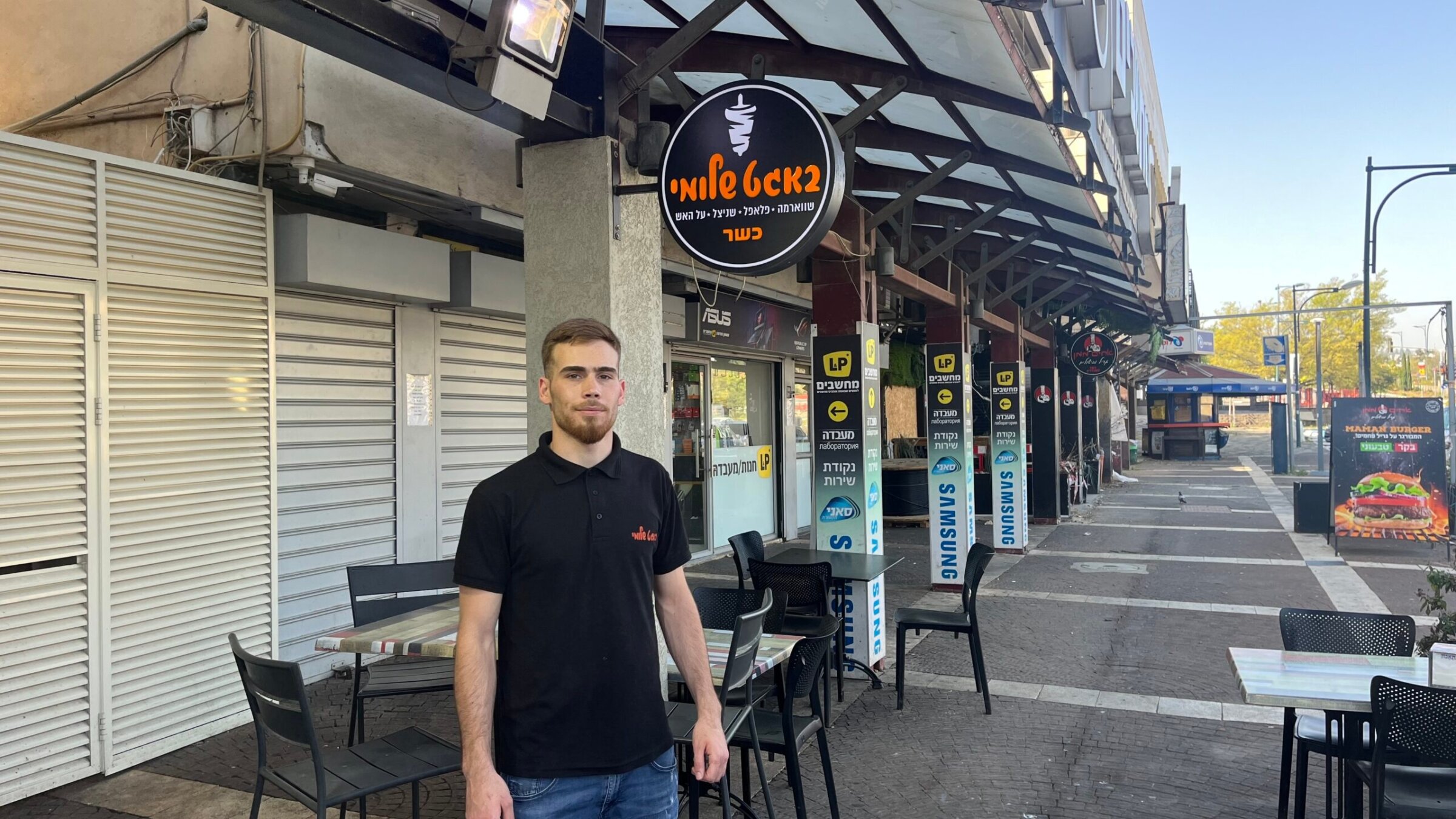
Toby Abutbul has stayed in Kiryat Shmona to run his family’s restaurant despite the evacuation of the city due to war. (Uriel Heilman)
This story is part of “Israel’s Northern Front,” a series examining life during wartime at Israel’s northern border.
KIRYAT SHMONA, Israel (JTA) — One evening last November, Toby Abutbul was busy with his family’s shawarma restaurant on the main drag of the northern Galilee city of Kiryat Shmona when an anti-tank missile fired by Hezbollah slammed into the sidewalk a couple of doors down.
Nearby gas canisters exploded, the street instantly burst into flames, cars caught fire and smoke filled the night air.
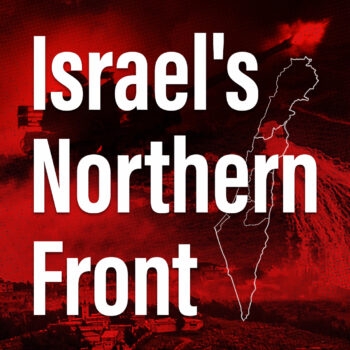
By then, the vast majority of the 25,000 residents of this city less than two miles from the Lebanon border had fled, many to hotels — part of an evacuation of more than 60,000 people from northern Israel after Hamas’s Oct. 7 attack from Gaza and Hezbollah’s ensuing attacks from Lebanon.
A man at the site suffered a shrapnel wound to his chest. No one was killed.
Five months on, Kiryat Shmona is still a ghost town and Hezbollah’s daily attacks on northern Israel continue unabated. But Abutbul’s fast-food restaurant, Baguette Shlomi, remains open. It’s one of only a couple of eateries still operating in the city.
“There’s a need that has to be met,” said Abutbul, 22. “There are almost no civilians here. Only soldiers have stayed, and they basically have no place to eat. We stayed for the soldiers, and to try to keep up a normal routine. Staying at hotels for evacuees doesn’t suit us.”
Abutbul’s determination to remain, keep his restaurant running and try to support soldiers on the front lines reflects how Israelis in the conflict zone are endeavoring to stay resilient amid what feels like a long war of attrition far from the front lines of Gaza, where most of the world’s attention was focused until this week’s attack on Israel by Iran.
An estimated 850 to 1,500 residents are still in Kiryat Shmona. Every so often, someone in the city is killed by enemy fire.
“You don’t know what you’re waking up to, and you don’t know what’s the future,” said Abutbul’s mother, Jessica. “I don’t know if the government knows, if the state knows or if the army knows. It leaves us with a very unpleasant feeling.”
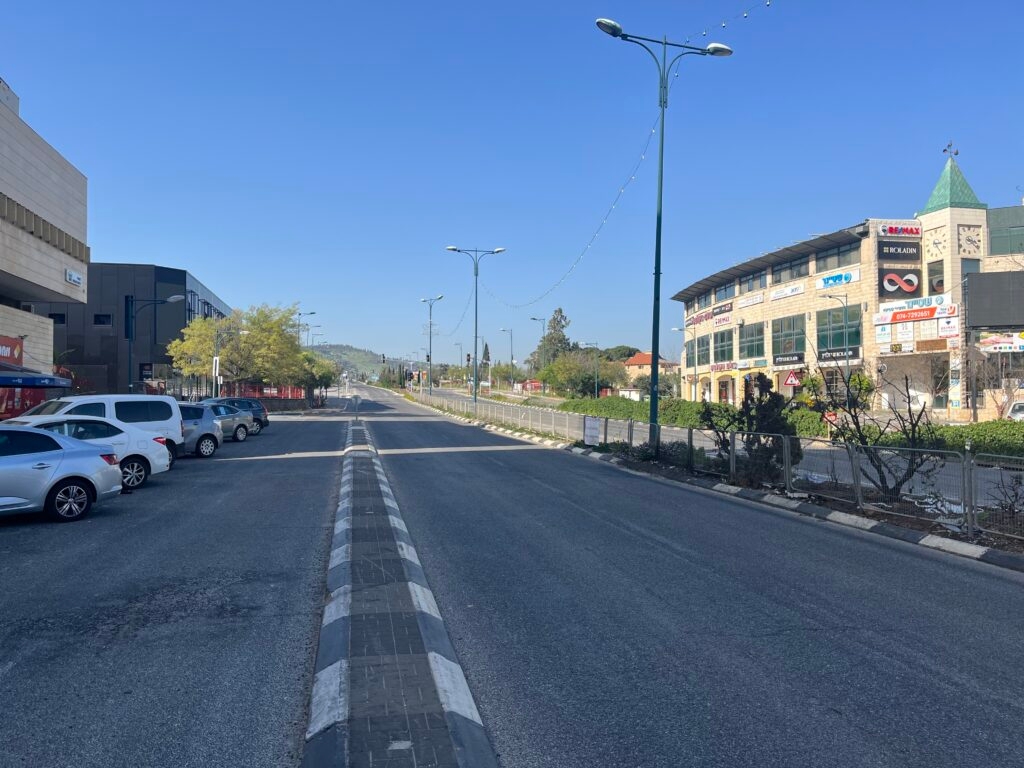
Kiryat Shmona, a city of 25,000, has been a ghost town since a mandatory evacuation in the early days of Israel’s Oct. 7 war. Nevertheless, a few residents remain even six months into the evacuation. (Uriel Heilman)
What’s clear to most Israelis is that the current situation is untenable and has no clear solution. Hezbollah is larger and better equipped than Hamas, and an all-out war with the Lebanese terrorist group likely would be far more destructive to Israel than the war in Gaza. Yet short of war, many Israelis believe it’s not possible to remove the threat Hezbollah poses — including its ability to launch an Oct. 7-style attack.
Hezbollah mounts attacks in myriad forms. Anti-tank missiles are the most dangerous, coming without the warning of an air-raid siren because they are portable and fly quickly in a direct line rather than in the longer arc of a rocket. They’re too fast to be intercepted by the Iron Dome missile defense system and too powerful to be avoided by fleeing to the ubiquitous safe rooms designed to offer Israelis protection from attacks. Anti-tank missiles can tear through safe room walls like a bullet going through a tin can.
Hezbollah also fires longer-range rockets into northern Israel. And the terror group deploys drones that infiltrate Israeli airspace to carry out attacks or reconnaissance.
The Israelis remaining in Kiryat Shmona have adopted varying precautionary measures. Traffic lights in the city have all been turned to flashing yellow so cars don’t have to stop at intersections; it’s safer to speed through town because a moving target is harder for Hezbollah to hit.
Abutbul keeps a helmet, flak jacket and tourniquets in his car in the event of an attack. When sirens sound — or, just as likely, if there’s a boom without a siren, indicating an impact — locals know to race to the nearest possible shelter or, if none is in reach, lie prone on the ground.
When a late-afternoon interview with Abutbul suddenly is interrupted by an air-raid siren, he dashes from a sidewalk table into the restaurant’s rear kitchen. The handful of patrons at the restaurant huddle inside, phones buzzing with alerts warning of a rocket attack. After one minute another siren sounds; this time Israel’s Homefront Command app indicates an infiltration by enemy aircraft — most likely a drone.
After a couple of minutes Abutbul says it’s safe to venture outside because there were no boom sounds. The shawarma plates on the table are still warm. Overhead, an Israeli warplane streaks through the sky.
Abutbul has seen strikes up close. On Feb. 13, he was driving on a Kiryat Shmona road when two anti-tank missiles landed some 200 yards away, seriously injuring a 47-year-old woman and her 15-year-old son. Abutbul’s dashboard camera captured both strikes. The air-raid siren sounded only after the second hit.
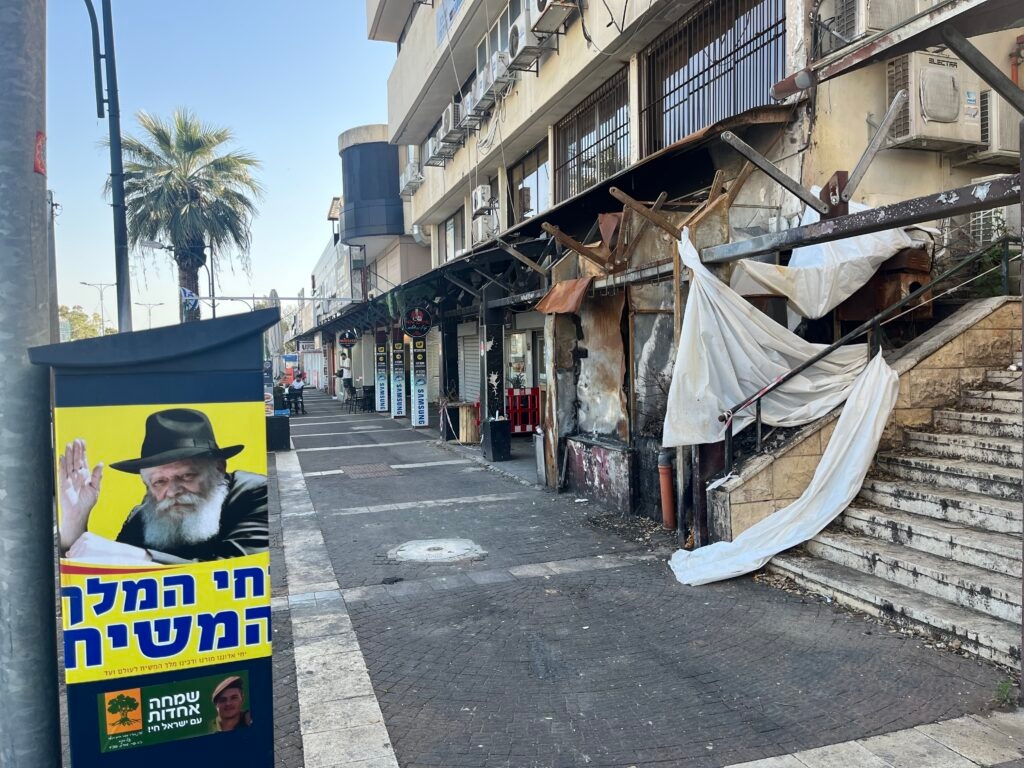
A scorched storefront on Kiryat Shmona’s main drag bears signs of a Hezbollah missile strike in November 2023. (Uriel Heilman)
“I was on a routine drive. The missile came out of nowhere. There was no siren,” Abutbul recalled. “I immediately stopped my car in the middle of the road, ran into some nearby bushes and lay down against a wall. Then the second missile hit and I could hear the mother screaming.”
Abutbul called an ambulance, waited three minutes to make sure the immediate danger had passed, and then ran to help the wounded, who lay bleeding. Military medics were the first to arrive on the scene.
“Generally I drive around with a tourniquet, but I didn’t have one at the time,” Abutbul said. “I regret that I wasn’t able to administer first aid.”
Despite the dangers, he still has a few loyal customers. Kiryat Shmona evacuee Rotem Sela is no longer living in the city but says he stops by Baguette Shlomi whenever he can. He returns every couple of days for his work as a war videographer.
“Whenever I go, I eat at the restaurant, both because I have to eat and because I want to support them,” Sela said. “And there aren’t many options. That’s what there is.”
For the first few months of the war, Sela stayed behind in the city even as most of his family evacuated to Tiberias, about 30 miles due south. But as the war dragged on, the situation became increasingly untenable. His 12-year-old son who had stayed behind with him had no school to attend and no friends for company. They decamped to Tiberias in February.
“It’s a ghost town,” Sela said of Kiryat Shmona. “Everything is closed except for the supermarket, and that’s only open half the day. Soldiers use it and that’s about it.”
Much of Baguette Shlomi’s business also comes from soldiers, either via deliveries to the front or from customers dropping by the restaurant at all hours. The most popular item on the menu is shawarma in a baguette — a dish priced at about $11.50 that, according to Abutbul, can keep a soldier’s belly full for a whole day.
The restaurant first opened in 2006, two months before the outbreak of the Second Lebanon War, the last major conflict to envelop the area. At the time, Abutbul’s father, Shlomi, for whom the restaurant is named, likewise decided to keep it running despite the perils. Then, too, there was a need to stay open for soldiers.
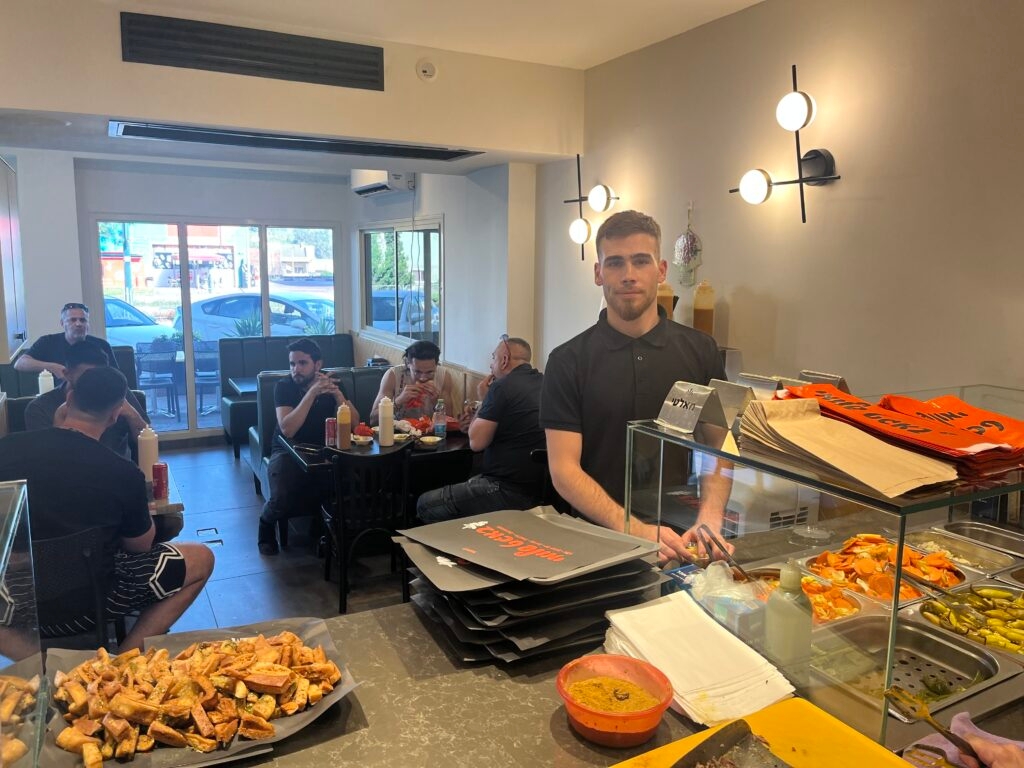
Most of the customers these days at Baguette Shlomi, a shwarma restaurant in Kiryat Shmona, Israel, are soldiers, April 2024. (Uriel Heilman)
Abutbul knows what it’s like to be deployed in the area. When Hamas attacked Israel on Oct. 7, Abutbul was called up to reserve duty. He served for 62 days in the nearby Golan Heights, experiencing frequent rocket, missile and artillery attacks. A recently discharged veteran of Israel’s Golani infantry forces, he never before had experienced direct enemy fire.
His own family is spread around the country. Abutbul’s girlfriend left for the southern resort city of Eilat to work in a restaurant, and the couple meets up every other weekend or so at her parents’ place in the Tel Aviv area.
She has the Red Alert app on her phone, which informs her whenever Kiryat Shmona is under attack. Abutbul is dutiful about checking in with her every time to let her know he’s OK.
Some nights Abutbul’s parents decamp to a hotel in Tiberias. The government is footing the bill for hotel lodging and meals for Israeli residents of mandatory evacuation zones like Kiryat Shmona, but not from places farther from the border that haven’t been ordered to evacuate, even though they’re still within range of Hezbollah attacks. Almost all of Abutbul’s friends have left town, and he believes many will never return; they’ve gotten used to life in the relatively safe center of the country, he said.
But Abutbul is adamant about staying. “I have a business here, and responsibilities,” he said.
His mother, Jessica, says she feels relatively safe because the restaurant’s kitchen doubles as a bomb shelter, and the family has a bomb shelter at home. But she doesn’t dare walk around the streets, which are deserted. Fortunately, she said, the restaurant’s suppliers all have continued making deliveries to the store.
The restaurant’s only remaining deliveryman, Daniel, said he decided to stay for the same reasons as his boss — to help soldiers stationed in the area and to avoid letting Hezbollah drive him from his home.
“I want to give as much as I can,” said Daniel, who asked that his last name not be published. “I don’t want to show fear like a worm.”
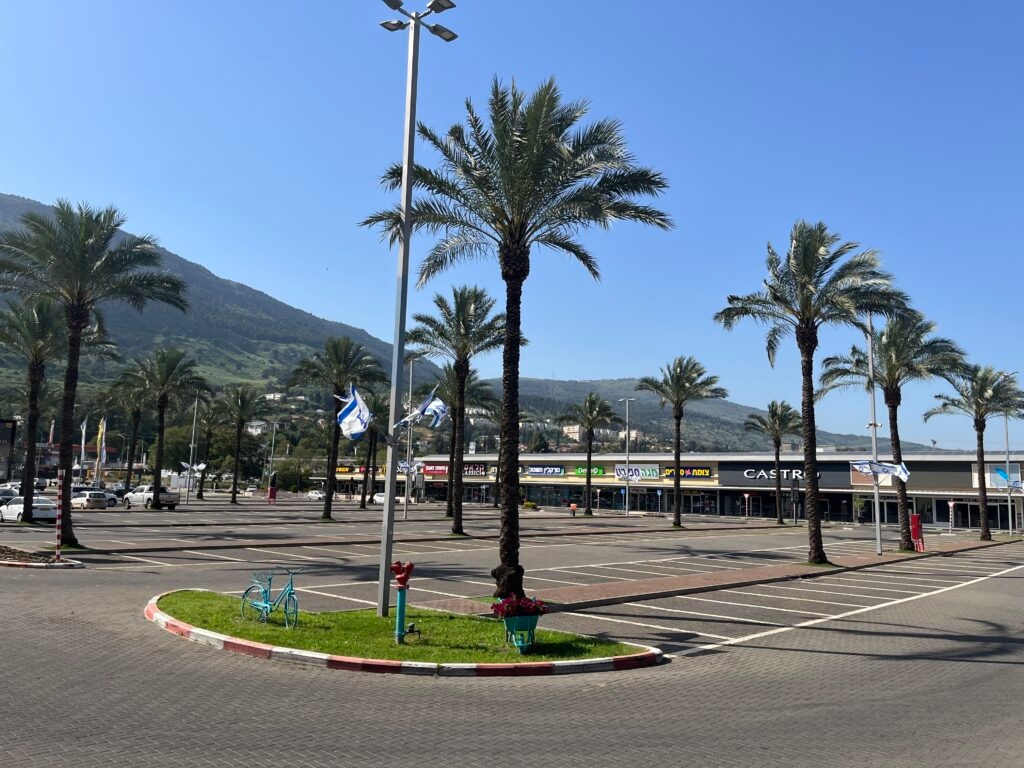
A shopping mall in the evacuated city of Kiryat Shmona is virtually deserted, April 2024. (Uriel Heilman)
Daniel acknowledged that he has trouble sleeping but said running to the bomb shelter is second nature. As a child of Kiryat Shmona, he’s been doing it since he was little. What’s new this time, he said, is that the city has been evacuated and that Hezbollah has more potent weapons.
“The anti-tank weapons are new,” Daniel said. “First it falls, then we hear the siren.”
The hardest part of enduring the current situation, locals say, is uncertainty about the future. The war already is in its seventh month. While the government has sent the Israeli Defense Forces deep into Gaza and committed, at least verbally, to neutralizing the threat from Hamas, the northern front — where there has been no move toward an Israeli ground invasion to neutralize the threat from Hezbollah — remains unresolved. The simmering tensions with Iran only deepen the uncertainty.
“There’s no horizon for returning,” Abutbbul said. “The government is abandoning us. We don’t know how we’ll return or when. I support any decision to end this situation so we can go back to normal life.”
This article originally appeared on JTA.org.















